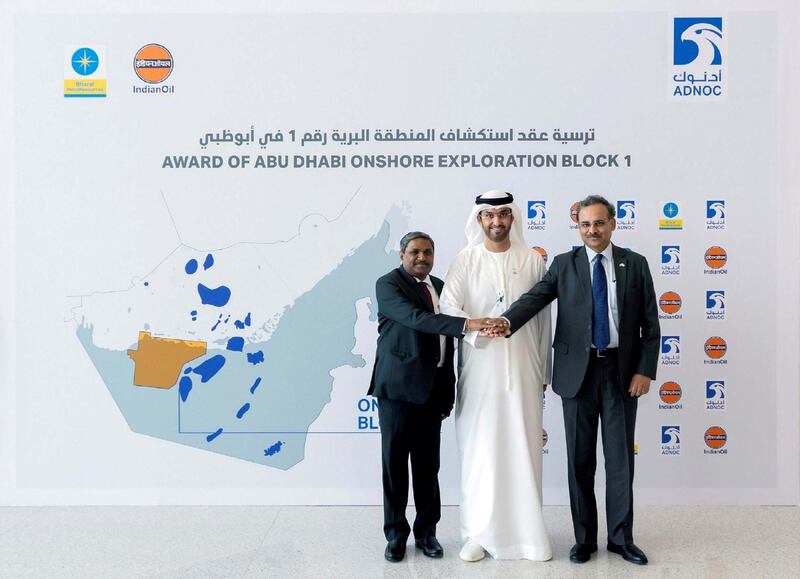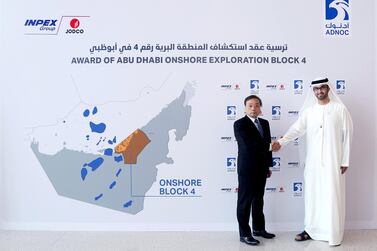Abu Dhabi National Oil Company awarded exploration rights to a consortium of two Indian companies for Dh626 million for an onshore block, as part of its first licensing round.
Bharat Petroleum Corporation and Indian Oil Corporation were awarded 100 per cent interest in the exploration phase to appraise undeveloped fields around Abu Dhabi’s western region of Ruwais, Adnoc said on Monday.
#DrSultanAlJaber: This award highlights the important role of energy cooperation in strengthening the strategic relationship between the #UAE and #India and underlines #ADNOC’s 2030 smart growth strategy
— ADNOC Group (@AdnocGroup) March 25, 2019
The Indian consortium will have the opportunity to develop the existing discoveries, with Adnoc retaining a 60 per cent stake during the production phase.
“The consortium of Bharat Petroleum Corporation and Indian Oil Corporation, both of whom Adnoc already partners with offshore, was selected after a very competitive bid round,” Dr Sultan Al Jaber, Adnoc Group chief executive and UAE Minister of State said.
The award to the Indian consortium concludes Adnoc's first-ever licensing round, which saw five of the six blocks tendered picked up by Italy's Eni, Thailand's PTT Exploration and Production Public Company, Occidental of the US and Japan's Inpex. Onshore Block 2, which had been part of the tendered concessions is currently being appraised for "unconventional potential" before the company considers further award decisions, an Adnoc spokesman told The National.
The sale of exploration stakes to the Indian consortium is another indication of the Abu Dhabi company’s increasing engagement with its consumer base in Asia. Adnoc last year awarded a consortium of Indian energy companies led by ONGC Videsh a 10 per cent interest in the offshore Lower Zakum block, following the split and reallocation of its Adma-Opco concessions.
Indian energy companies, which have until recently not had any presence in in the Middle East, are being increasingly wooed by state companies such as Adnoc, said Amit Bhandari, senior fellow, energy and environment with Mumbai-based think tank Gateway House.
“Oil demand from the traditional markets (US, Europe and Japan) is declining, while China’s oil demand seems to be plateauing," he said. "Moreover, the US is also likely to become a hydrocarbon exporter. India is likely to account for a large share of growth in the global oil demand over the next 20 years."
State-backed firms such as Bharat Petroleum and Indian Oil Corporation run a lucrative and strategic network of refineries and fuel distribution outlets in India as well.
"Having them as investors in its upstream assets should result in improved market access for Adnoc,” added Mr Bhandari.
Adnoc also parks strategic crude reserves in the southern Indian city of Mangalore and is looking to develop a $44 billion integrated refinery on the country’s western coast in partnership with Saudi Aramco.
These moves while helping to lock-in long-term market share for the national oil company also allow for a consuming nation such as India to hedge against high oil prices. Countries such as India and China recently formed an ‘Asian buyers’ club’ to negotiate for better pricing and mitigate the effects of highly volatile oil prices.
"Such investments therefore help cushion the impact of high energy prices for the Indian government, which has to provide subsidies to protect the most vulnerable consumers,” said Mr Bhandari.
Adnoc meanwhile is likely to offer a second licensing round this year. The company announced in November discovery of deposits equivalent to a 1 per cent increase to existing oil reserves and a 7.1 per cent addition to proven gas reserves.
The national oil company is widely expected to “continue as they have been progressing,” according to Tom Quinn, senior research analyst for Middle East at Wood Mackenzie.
"They’ve managed to get a good mix of companies, international companies and Asian companies in terms of market size," he said. "They also managed to get some pretty big participation bonuses paid by these companies and having that capital upfront allows them to invest in capacity building projects and other projects."








